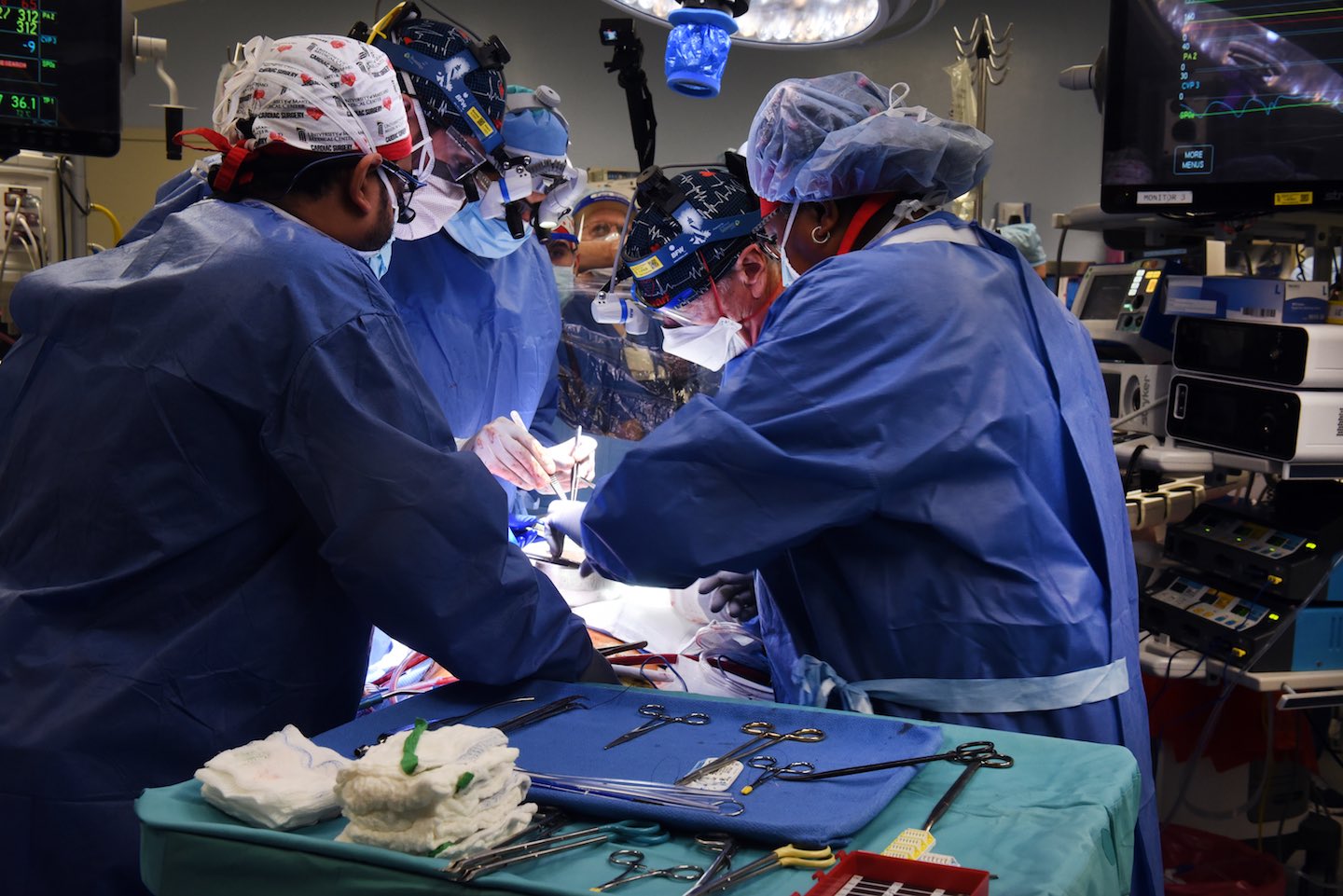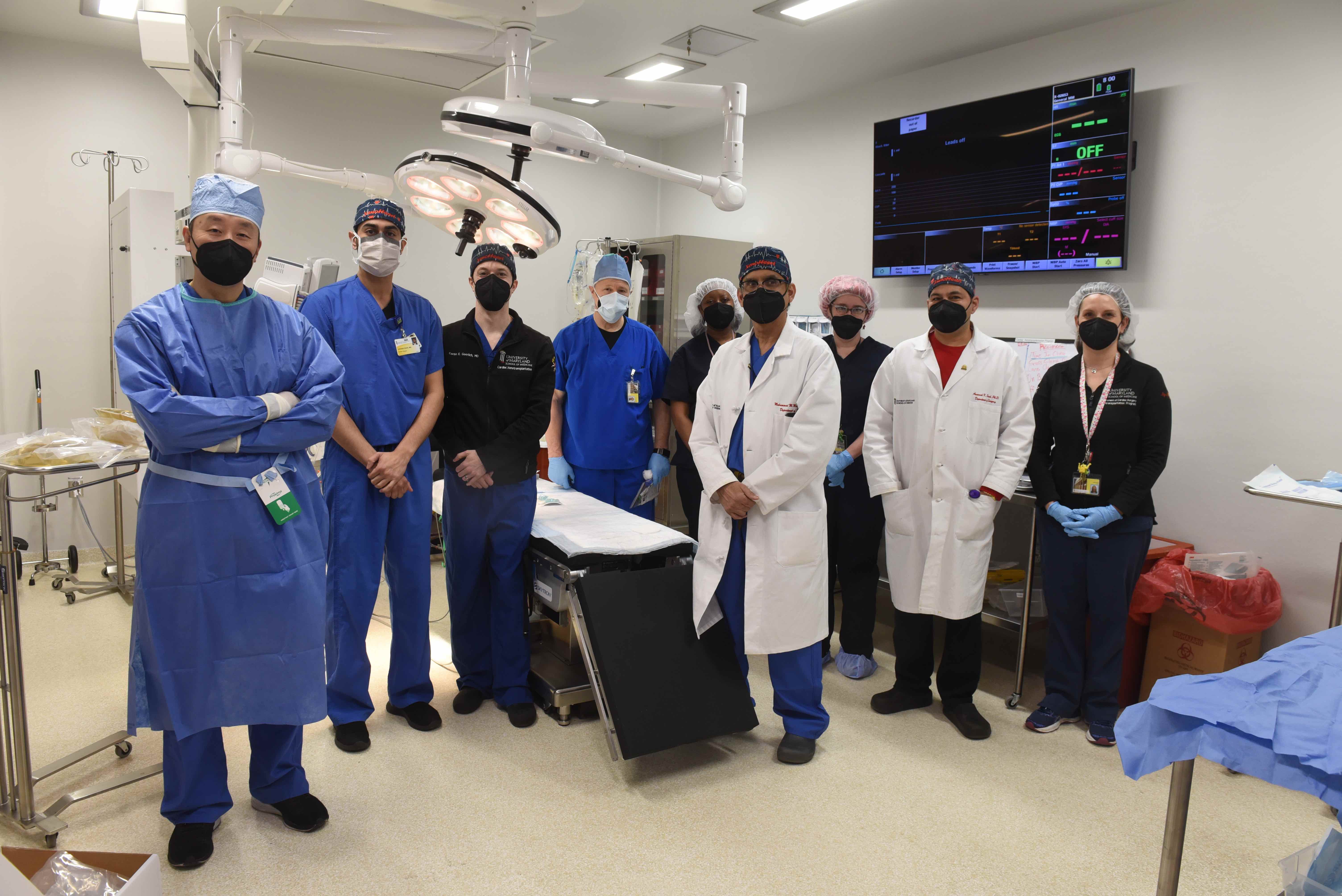When Dr. Muhammad Mohiuddin was growing up in the seaside city of Karachi in Pakistan, the word “pig” was taboo at home. Mentioning it even accidentally would have him punished and told to wash his mouth.
“My mother used to make me gargle,” Mohiuddin told VICE World News. “It was a big no-no in my family. It was forbidden in our home.” Mohiuddin would even accompany his father and brother to hunt wild pigs outside the bustling metropolis, in rural areas of the Sindh province.
Videos by VICE
Fast-forward decades and now the doctor is one of the pioneers behind the first genetically modified pig heart to be transplanted into a human body.
The groundbreaking surgery took place in the first week of the year at the University of Maryland Medical Center. Mohiuddin is their director of cardiac xenotransplantation, the process of transplanting a living heart from one species to another.
Led by Mohiuddin and Bartley P. Griffith, the director of the center’s cardiac transplant program, the latest procedure used a heart from a genetically altered pig supplied by Swedish biotech company Revivicor, and a rare immunosuppressive agent. The recipient of the heart is a 57-year-old man, currently in recovery.
In the United States, which has an acute organ shortage crisis, the transplant has opened up vistas of life-saving possibilities for thousands on national organ transplant lists.
“Almost 150,000 people lose their lives a year just in the U.S., you can calculate how many more throughout the world lose their lives just because organs are not available,” Mohiuddin said. “If this technique is successful, we will be able to save almost all of them.”

Mohiuddin’s journey began after graduating from the Dow Medical College in Pakistan with dreams of becoming a cardio-thoracic surgeon. In 1992, he came to the U.S. and matched with a fellowship program at the University of Pennsylvania, where a mentor advised him to look into transplant research.
“He asked me, ‘Are you interested in something like that? If it works out, it will exponentially increase your chances of helping a lot more people than you will in your entire life,’” said Mohiuddin.
The rest is history. The doctor soon transitioned into the field of xenotransplantation or interspecies transplants.
“Many times I thought that I don’t want to do this. There are so many issues in xenotransplantation that, in the back of my mind, I always used to think whether we will ever be able to take it to the clinic.”
It took decades of disappointment to reach this level of success in a transplant. It’s been 16 days since the operation, and the pig heart hasn’t been rejected by the recipient’s body.

Making it happen was no simple feat. Mohiuddin, a devout Muslim, grappled with religious apprehensions during the course of his 30-year research. The consumption of pork is considered haram or forbidden in Islam, and in some Pakistani Muslim circles associations with the animal are greatly frowned upon.
“I got quite a backlash from my family. ’Why are you using this animal?’ My father used to always ask me, ‘Can you at least try using another animal?’” said Mohiuddin.
Although the doctor and his team did examine alternative animal organs during the course of their research, the genetic components of pig hearts proved ideal for the purpose.

“We have manipulated the genes of these pigs in a way that it becomes a little bit closer to humans in terms of immunology. We did not convert it into human, but we changed the genes in a way that the [organ] rejection was delayed,” Mohiuddin said. “It’s like a transplant from human to human, where you still have to use drugs but you know you can control it. If we had not done that, the rejection happens within minutes and the organ is useless.”
The use of pig organs also inspires less controversy outside the Muslim world. “Since I live in a country where pork is consumed on a regular basis it was not an ethical issue here in the Western world. It was easier,” said Mohiuddin.
But his family’s anxieties and his own faith led Mohiuddin to question the use of pigs. “I try to follow all the tenets of Islam, so that concern was in the back of my mind all the time. So, I used to try to find reasoning for me to continue using this animal,” said Mohiuddin.
To allay his doubts, Mohiuddin consulted with a number of religious scholars from around the world until he finally received his answer. “The final consensus was that there’s nothing greater in the eyes of God than saving the life of a human,” he said.
But the challenges didn’t end there. The procedure’s novel use of a solution combining a unique cocktail of hormones and a minute but controversial amount of cocaine invited close inspection by the U.S. Drug Enforcement Administration.
“The cocaine name pops out because everybody thinks, ’Oh my God, what is cocaine doing in here?’” Mohiuddin said.
The brew, which contains around 10 hormones including cortisol and adrenaline, is sold by the Swedish company XVIVO. Mohiuddin’s team is the first in the U.S. to use it. The cocktail helps extend the viability of the heart during transport to about 24 hours. In the past, harvested hearts have deteriorated during transport, impairing their ability to function after transplant surgery.

The scientific reasons behind the efficacy of the cocaine and hormone solution in preserving and treating harvested hearts is unknown. However, Mohiuddin found that it effectively prevents heart failure during transplants.
“When we were not using this solution, we were getting failures within 48 hours. But when we started using this and infusing the heart with this solution, the heart became well preserved and started beating very well,” he said.
After a lengthy permit application process with the anti-drug agency, the cocaine batch was imported for use in the surgery. “It’s a bit of a hassle but it’s a routine procedure when importing controlled substances,” said Mohiuddin.
The doctor recommends the broad use of the cocaine-laced solution in other transplant procedures in the country. “It will be a great advance if this process is approved by the regulatory agencies here also, as we cannot get hearts usually within the span of two to three hours. This will allow us to get hearts from other states.”
Follow Rimal Farrukh on Twitter.







